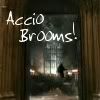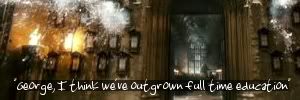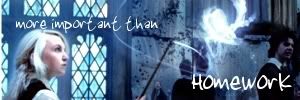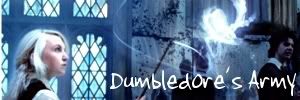And we can all breath easily and sleep soundly once again. ;)
Read the full story on Narniaweb.
Saturday, January 31, 2009
Tuesday, January 27, 2009
Super Cool Star Wars Video
I found this posted over at author Sarah Beth Durst's blog and it was too fun not to share with all of you! Check it out and see where the Star Wars Theme Music really comes from!
Harry Potter Avatars and Signatures
Monday, January 26, 2009
Writer's Group Assignment - Part Two
After racking my brain for something interesting to say today, I decided just to share with you all the first part of my story for our writer's group. This is about a fourth of what has been written so far. I'm not exactly sure when I'll get a chance to finish it, between homework and novel work. But maybe if I get some pleas for more it will go quicker...
And the whole town was stirred because of them.
~ Ruth 1:19
The good ladies of Little Wheaton were all in a dither.
“Did you hear?” said Mrs. Morrow to her sister, Lady Neversham. “Our cousin, Mary Emmerson is coming home at last!”
“Good gracious!” Lady Neversham lowered her spectacles and stared at Mrs. Morrow with proper astonishment. “And still in mourning too! But I suppose she hadn’t a choice, with those filthy French peasants running around the country with la Guillotine.”
Mrs. Morrow nodded. “Mr. Morrow said she was fortunate to make it out of Calais with her head! She was rowed out in the darkest hour of night without a single satchel with her. What a pity. I was so counting on her for the latest fashions.”
“Tsk,” said Lady Neversham. “I don’t approve of French styles. To much rouge and too little cloth.”
“Of course, you are quiet right,” Mrs. Morrow agreed hastily. “And besides, that is hardly the most shocking part about it!”
Lady Neversham raised her eyebrows in curiosity. Mrs. Morrow leaned in obligingly and whispered:
“She is bringing her French daughter-in-law with her!”
“Good heavens! I thought we were well rid of that association!”
“Oh, it’s quite true, I assure you,” said Mrs. Morrow. “Mr. Morrow had it in a letter from Mary herself! They’re on their way up from London now, and will be here just in time for Lord Robert’s Harvest Ball.”
Lady Neversham sighed. “How tiresome. I hope this daughter-in-law is not unusually pretty. The men do chase so after beautiful foreign women and I was hoping to finally get my Eliza married off.”
“Oh, I wouldn’t worry,” said Mrs Morrow with a knowing look. “They say her brothers are leaders among the Jacobins. I doubt any of our gentlemen will care to associate themselves with anarchy.”
“Ah. Poor Mary. To have such a girl for a daughter-in-law. One would have thought she’d have the decency to leave after poor Charles died.”
“Dear Charles. He was always such a fine lad.”
“Yes, I used to hope he’d marry my Eliza.”
“I could never see why he wouldn’t. Eliza is such a beauty.”
Lady Neversham nodded. “A regular siren that French woman must be. And a widow, no less! Men always seem more entranced by beautiful widows. I pray to God that she won’t ensnare any of our good gentlemen of Little Wheaton!”
And the whole town was stirred because of them.
~ Ruth 1:19
The good ladies of Little Wheaton were all in a dither.
“Did you hear?” said Mrs. Morrow to her sister, Lady Neversham. “Our cousin, Mary Emmerson is coming home at last!”
“Good gracious!” Lady Neversham lowered her spectacles and stared at Mrs. Morrow with proper astonishment. “And still in mourning too! But I suppose she hadn’t a choice, with those filthy French peasants running around the country with la Guillotine.”
Mrs. Morrow nodded. “Mr. Morrow said she was fortunate to make it out of Calais with her head! She was rowed out in the darkest hour of night without a single satchel with her. What a pity. I was so counting on her for the latest fashions.”
“Tsk,” said Lady Neversham. “I don’t approve of French styles. To much rouge and too little cloth.”
“Of course, you are quiet right,” Mrs. Morrow agreed hastily. “And besides, that is hardly the most shocking part about it!”
Lady Neversham raised her eyebrows in curiosity. Mrs. Morrow leaned in obligingly and whispered:
“She is bringing her French daughter-in-law with her!”
“Good heavens! I thought we were well rid of that association!”
“Oh, it’s quite true, I assure you,” said Mrs. Morrow. “Mr. Morrow had it in a letter from Mary herself! They’re on their way up from London now, and will be here just in time for Lord Robert’s Harvest Ball.”
Lady Neversham sighed. “How tiresome. I hope this daughter-in-law is not unusually pretty. The men do chase so after beautiful foreign women and I was hoping to finally get my Eliza married off.”
“Oh, I wouldn’t worry,” said Mrs Morrow with a knowing look. “They say her brothers are leaders among the Jacobins. I doubt any of our gentlemen will care to associate themselves with anarchy.”
“Ah. Poor Mary. To have such a girl for a daughter-in-law. One would have thought she’d have the decency to leave after poor Charles died.”
“Dear Charles. He was always such a fine lad.”
“Yes, I used to hope he’d marry my Eliza.”
“I could never see why he wouldn’t. Eliza is such a beauty.”
Lady Neversham nodded. “A regular siren that French woman must be. And a widow, no less! Men always seem more entranced by beautiful widows. I pray to God that she won’t ensnare any of our good gentlemen of Little Wheaton!”
Thursday, January 22, 2009
A Midsummer Night's Dream
I decided to take a few courses from a local community college this spring. First because I figured it was time to get back cracking at that BA, and secondly because the classes just looked interesting.
So far it appears that I've been right on both counts.
Tuesday night I had my first class for the Shakespeare course and I just loved it. We have an amazing professor, and for once in my life I find myself able to understand Shakespeare without bursting a blood vessel. Of course, that could be because I never actually read "A Midsummer Night's Dream" before.
(or it could be that I'm just finally mature enough to enjoy the Bard's poetry.)
What really surprised me about our lecture on Tuesday (which was half lecture, half dramatically reading the play aloud, which rocked) was that the main theme of MND is love. I don't know why that surprised me. Love is a central theme in many of Shakespeare's plays. I guess I didn't realize how central it was to MND's plot.
(The following is adapted from my notes, and reflects the lecture given by the Professor, as well as some thoughts of the other students. I claim no authorship, rather personal reflection. Also, I was inspired to share my interest in my class subjects by my friend Carpe, whose new blog "Thoughts from Gaming" illustrates that what is learned in school really can be interesting enough to pass onto one's friends.)
To continue.
MND's main theme is thus:
Love looks not with the heart, but with the mind.
Now at first glance, this looks kind of weird. It seems to be saying that love looks not with emotion, but with rationality. Which is definetely not the theme of MND.
No, the message here is that love is irrational. Love is not what you see, but rather what you transform in your mind. What you imagine.
Imagination is the key point in this play. In fact, one could say that the flower with which the characters are charmed into new love is imagination embodied. It gives the mind new imaginative power to see loveable qualities in others. It allows Demetrius to love again the maid he hates, and Titania the fairy queen to fall in love with a donkey. (Or a man with a donkey's head.)
Reason has nothing to do with love.
Shakespeare makes this point over and over again. From the very beginning we hear that the two young suitors for Hermia's hand are alike in every way. Wealth, prestige, physical appearance...the only differance is that Lysander is the one beloved of Hermia.
And so this sets up the whole mad romp (or dream) through the woods, as love changes with a rapidity that throws everything off-kelter.
Demetrius loves Helena, Demetrius loves Hermia, Demetrius loves Helena again. Lysander loves Hermia. Lysander loves Helena. Lysander loves Hermia again. Titania loves Oberon. Titania loves Bottom of the Donkey's head. Titania loves Oberon...and so it goes.
And all this is possible because of the flower that is imagination.
Of course, this leads me personally to wonder how much of the "love" is really love, and how much is infatuation? What is the exact power of the flower? When Lysander turns from Hermia to Helena, is his love for Helena true unselfish love? Or is it infatuation, an affection for her that is passionate but not grounded on firmer foundations?
There is an answer to this, believe it or not. My professor asked us why Oberon could claim the changling child from Titania after she had fallen in love with Bottom. What had changed about Titania besides her strange affection for a man with a donkey's head?
True love.
As my Professor explained, (and won my esteem for saying so) when one is in true love, one is no longer selfish. Love changes and transforms us and how we see others.
Now of course I would say that one cannot be happy in love forever. Love is a struggle, hard work.
But I think that one of the key differances between infatuation and true love (and I'm going off my memory of a diagram on the FT Forum that one of our members posted on the Twilight thread) is that true love is selfless. One cares more for the other person's needs and wishes than for ones own.
So do I think the flower's juice of imagination grants more than infatuation?
Considering the above, and considering that Demetrius is allowed to marry Helena under the power of the juice, I think the answer is yes.
So far it appears that I've been right on both counts.
Tuesday night I had my first class for the Shakespeare course and I just loved it. We have an amazing professor, and for once in my life I find myself able to understand Shakespeare without bursting a blood vessel. Of course, that could be because I never actually read "A Midsummer Night's Dream" before.
(or it could be that I'm just finally mature enough to enjoy the Bard's poetry.)
What really surprised me about our lecture on Tuesday (which was half lecture, half dramatically reading the play aloud, which rocked) was that the main theme of MND is love. I don't know why that surprised me. Love is a central theme in many of Shakespeare's plays. I guess I didn't realize how central it was to MND's plot.
(The following is adapted from my notes, and reflects the lecture given by the Professor, as well as some thoughts of the other students. I claim no authorship, rather personal reflection. Also, I was inspired to share my interest in my class subjects by my friend Carpe, whose new blog "Thoughts from Gaming" illustrates that what is learned in school really can be interesting enough to pass onto one's friends.)
To continue.
MND's main theme is thus:
Love looks not with the heart, but with the mind.
Now at first glance, this looks kind of weird. It seems to be saying that love looks not with emotion, but with rationality. Which is definetely not the theme of MND.
No, the message here is that love is irrational. Love is not what you see, but rather what you transform in your mind. What you imagine.
Imagination is the key point in this play. In fact, one could say that the flower with which the characters are charmed into new love is imagination embodied. It gives the mind new imaginative power to see loveable qualities in others. It allows Demetrius to love again the maid he hates, and Titania the fairy queen to fall in love with a donkey. (Or a man with a donkey's head.)
Reason has nothing to do with love.
Shakespeare makes this point over and over again. From the very beginning we hear that the two young suitors for Hermia's hand are alike in every way. Wealth, prestige, physical appearance...the only differance is that Lysander is the one beloved of Hermia.
And so this sets up the whole mad romp (or dream) through the woods, as love changes with a rapidity that throws everything off-kelter.
Demetrius loves Helena, Demetrius loves Hermia, Demetrius loves Helena again. Lysander loves Hermia. Lysander loves Helena. Lysander loves Hermia again. Titania loves Oberon. Titania loves Bottom of the Donkey's head. Titania loves Oberon...and so it goes.
And all this is possible because of the flower that is imagination.
Of course, this leads me personally to wonder how much of the "love" is really love, and how much is infatuation? What is the exact power of the flower? When Lysander turns from Hermia to Helena, is his love for Helena true unselfish love? Or is it infatuation, an affection for her that is passionate but not grounded on firmer foundations?
There is an answer to this, believe it or not. My professor asked us why Oberon could claim the changling child from Titania after she had fallen in love with Bottom. What had changed about Titania besides her strange affection for a man with a donkey's head?
True love.
As my Professor explained, (and won my esteem for saying so) when one is in true love, one is no longer selfish. Love changes and transforms us and how we see others.
Now of course I would say that one cannot be happy in love forever. Love is a struggle, hard work.
But I think that one of the key differances between infatuation and true love (and I'm going off my memory of a diagram on the FT Forum that one of our members posted on the Twilight thread) is that true love is selfless. One cares more for the other person's needs and wishes than for ones own.
So do I think the flower's juice of imagination grants more than infatuation?
Considering the above, and considering that Demetrius is allowed to marry Helena under the power of the juice, I think the answer is yes.
Tuesday, January 20, 2009
The News on Narnia
Have you been wondering what was up with Disney pulling out of the Narnia Franchise on Christmas Eve?
Here's the story.
Here's the story.
Thursday, January 15, 2009
Can a man write good romance?
A fellow forum member over at the FTN Forum posed this question on our ongoing discussion of Twilight. It inspired such a long answer from me, that I thought I'd go ahead and repost it here for all of you to read and discuss.
(from the forum, slightly edited)
Ha. We actually were recently talking about the fact that women write better romances than men. Because I mean, really, if you look at the Classics, the romantic classics (Pride and Prejudice, Jane Eyre, Christy) were all written by women. Men tend to write things like "The Count of Monte Cristo" and "A Tale of Two Cities" which, even though they have love stories in them, are not really romances.
That brings us of course to what really is a romance. I believe it was Nathaniel Hawthorne that defined a romance as a book that dealt with matters of the heart. By that defintion his work "The Scarlet Letter" is a romance, though it does not fit the commonly accepted idea of a romance (a love story).
A really good romance, like any sort of book, is one that we can connect with and relate to. We connect with Jane Austen's works because she portrays the human nature, specifically in regard to romantic relationships (though also the relationships between sisters) in a way that humans of all ages and both genders can relate to. "The Count of Monte Cristo" hinges on love relationships as well, but they don't grip us in the same way that the relationships in Pride and Prejudice do. That is because the driving theme of "The Count of Monte Cristo" is not a matter of the heart, but a matter of the soul. (Is revenge for man to take or to leave to God's judgement?)
I think this is because romance is far more important to women than to men. As a guy friend of mine pointed out, men could survive without romance, but they use it because it is so important to women. By that token romance is important to men as well, but only because they need it to woo women.
The best books, however, the ones that become classics, are about more than romance, however. A woman like Jane Austen can write a romance that becomes universally loved because she is writing about the human nature. All classics are, essentially, about the great truths of human nature. And yet the best books usually do have a strong romantic element because romance is such a vital part of human life - and because it is the element that women identify the strongest with. As a woman, I can enjoy almost any kind of genre (except horror, which I hate) as long as it has some romantic aspect in it. However without romance, it becomes much harder to relate to. Now something like "The Great Escape" is just such a cool and amazing story that it doesn't matter at all whether or not it has romance in it. However I could not emotionally connect with the Red Badge of Courage because it was such a masculine story.
However, that said, do I think it's impossible for a man to write a good romance? No, of course not. Not any more than it is for a woman to write a good fantasy (like Harry Potter) or a good mystery (Agatha Christie). It just takes a man who is intuitive, and probably one who is also willing to observe and listen to the women in his life. (Just like women who write action adventure should be open to the critiques of the men in their life).
Plus, of course, any good author must also be a good observer of people.
(from the forum, slightly edited)
Ha. We actually were recently talking about the fact that women write better romances than men. Because I mean, really, if you look at the Classics, the romantic classics (Pride and Prejudice, Jane Eyre, Christy) were all written by women. Men tend to write things like "The Count of Monte Cristo" and "A Tale of Two Cities" which, even though they have love stories in them, are not really romances.
That brings us of course to what really is a romance. I believe it was Nathaniel Hawthorne that defined a romance as a book that dealt with matters of the heart. By that defintion his work "The Scarlet Letter" is a romance, though it does not fit the commonly accepted idea of a romance (a love story).
A really good romance, like any sort of book, is one that we can connect with and relate to. We connect with Jane Austen's works because she portrays the human nature, specifically in regard to romantic relationships (though also the relationships between sisters) in a way that humans of all ages and both genders can relate to. "The Count of Monte Cristo" hinges on love relationships as well, but they don't grip us in the same way that the relationships in Pride and Prejudice do. That is because the driving theme of "The Count of Monte Cristo" is not a matter of the heart, but a matter of the soul. (Is revenge for man to take or to leave to God's judgement?)
I think this is because romance is far more important to women than to men. As a guy friend of mine pointed out, men could survive without romance, but they use it because it is so important to women. By that token romance is important to men as well, but only because they need it to woo women.
The best books, however, the ones that become classics, are about more than romance, however. A woman like Jane Austen can write a romance that becomes universally loved because she is writing about the human nature. All classics are, essentially, about the great truths of human nature. And yet the best books usually do have a strong romantic element because romance is such a vital part of human life - and because it is the element that women identify the strongest with. As a woman, I can enjoy almost any kind of genre (except horror, which I hate) as long as it has some romantic aspect in it. However without romance, it becomes much harder to relate to. Now something like "The Great Escape" is just such a cool and amazing story that it doesn't matter at all whether or not it has romance in it. However I could not emotionally connect with the Red Badge of Courage because it was such a masculine story.
However, that said, do I think it's impossible for a man to write a good romance? No, of course not. Not any more than it is for a woman to write a good fantasy (like Harry Potter) or a good mystery (Agatha Christie). It just takes a man who is intuitive, and probably one who is also willing to observe and listen to the women in his life. (Just like women who write action adventure should be open to the critiques of the men in their life).
Plus, of course, any good author must also be a good observer of people.
Sunday, January 11, 2009
A Writer's Group Assignment
As I've mentioned before, I'm a part of a writer's group in my area comprised of Christain young people interested in writing and other areas of artistic creation. (Films, drawing, music, dancing, etc)
Last night we were given the assignment of writing a short story in which we set a Biblical story in another time period and genre.
I thought this was a pretty cool assignment, and also a good opportunity to talk a bit about how I go about writing a story, so I decided to blog about it. Plus, of course, I've been rather silent here lately since my energy has been focused on keeping the SOTB movie blog up to date.
For my story I have chosen the Book of Ruth. I've always loved that story and it has enough detail to give me a lot of jumping off points. Also the romantic aspect of it fits perfectly with my chosen era and genre. I'm retelling it in Jane Austen's England.
Since the story is set in England, the logical country to parallel Moab is France, since England and France were at war with each other quite often in this era. My Ruth is a young woman named Rachelle who is not only French, but also family to the revolutionaries themselves. Despite this, her husband was actually beheaded in the Reign of Terror and Rachelle's loyalty to his memory drove her to accompany her mother-in-law, Mary, to England.
This sets up proper conflict right at the beginning of the story and also gives me some cool historical tidbits to work in.
I had fun picking names for my parallel characters as well. Ruth became Rachelle because a) I love the name and b) they have similar feelings to them and c) it is plausibly and visually French.
Naomi was a bit trickier. Nicole would work if Naomi were French in origin, but she's not, she's English. So I wanted something that had a very anglo feel to it. Well in Ruth 1 Naomi asks to be called "Mara", which means bitter, because of the tragedies that have come upon her. In the New Testament we see the name Mara become Mary. So my Naomi easily fits into the name "Mary."
Ruth's husband is named Chilion, which becomes Charles in my story. And since Naomi's husband was called Elimelech, I gave my ladies the last name of Emmerson.
On to the little town of Bethlehem! "Beth Lehem" in Hebrew means house of bread, so I ran through the bread-related names in my head and choose to call the English town Little Wheaton.
Similarily Boaz, son of Salmon becomes Lord Robert Haddock.
And gleaning wheat at Boaz's harvest is about to turn into searching out a future at Lord Robert's Harvest Ball...
Last night we were given the assignment of writing a short story in which we set a Biblical story in another time period and genre.
I thought this was a pretty cool assignment, and also a good opportunity to talk a bit about how I go about writing a story, so I decided to blog about it. Plus, of course, I've been rather silent here lately since my energy has been focused on keeping the SOTB movie blog up to date.
For my story I have chosen the Book of Ruth. I've always loved that story and it has enough detail to give me a lot of jumping off points. Also the romantic aspect of it fits perfectly with my chosen era and genre. I'm retelling it in Jane Austen's England.
Since the story is set in England, the logical country to parallel Moab is France, since England and France were at war with each other quite often in this era. My Ruth is a young woman named Rachelle who is not only French, but also family to the revolutionaries themselves. Despite this, her husband was actually beheaded in the Reign of Terror and Rachelle's loyalty to his memory drove her to accompany her mother-in-law, Mary, to England.
This sets up proper conflict right at the beginning of the story and also gives me some cool historical tidbits to work in.
I had fun picking names for my parallel characters as well. Ruth became Rachelle because a) I love the name and b) they have similar feelings to them and c) it is plausibly and visually French.
Naomi was a bit trickier. Nicole would work if Naomi were French in origin, but she's not, she's English. So I wanted something that had a very anglo feel to it. Well in Ruth 1 Naomi asks to be called "Mara", which means bitter, because of the tragedies that have come upon her. In the New Testament we see the name Mara become Mary. So my Naomi easily fits into the name "Mary."
Ruth's husband is named Chilion, which becomes Charles in my story. And since Naomi's husband was called Elimelech, I gave my ladies the last name of Emmerson.
On to the little town of Bethlehem! "Beth Lehem" in Hebrew means house of bread, so I ran through the bread-related names in my head and choose to call the English town Little Wheaton.
Similarily Boaz, son of Salmon becomes Lord Robert Haddock.
And gleaning wheat at Boaz's harvest is about to turn into searching out a future at Lord Robert's Harvest Ball...
Subscribe to:
Posts (Atom)









